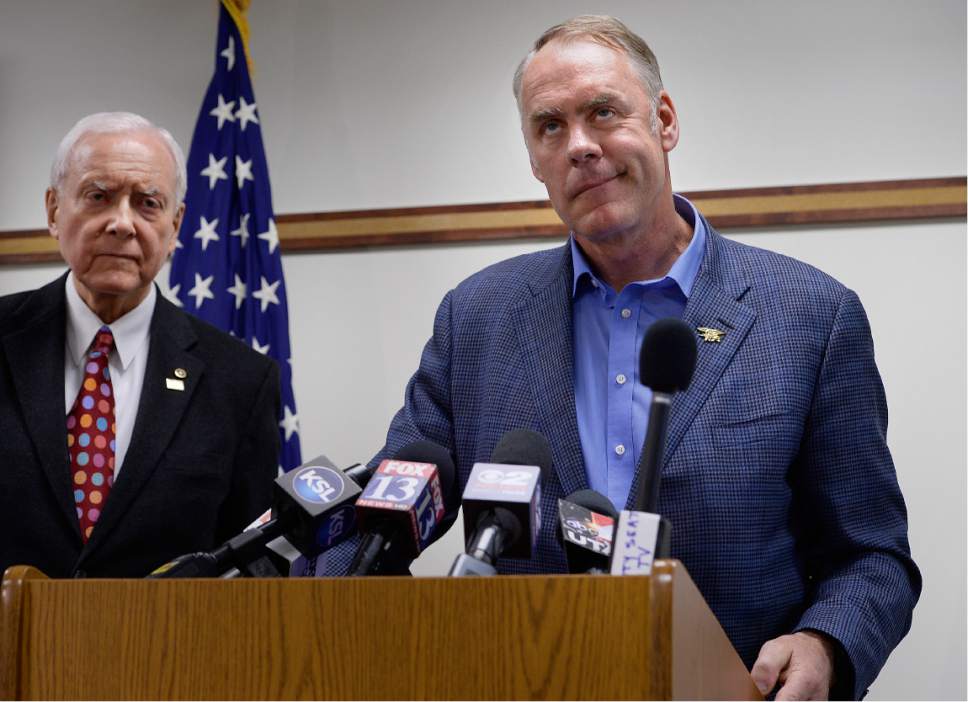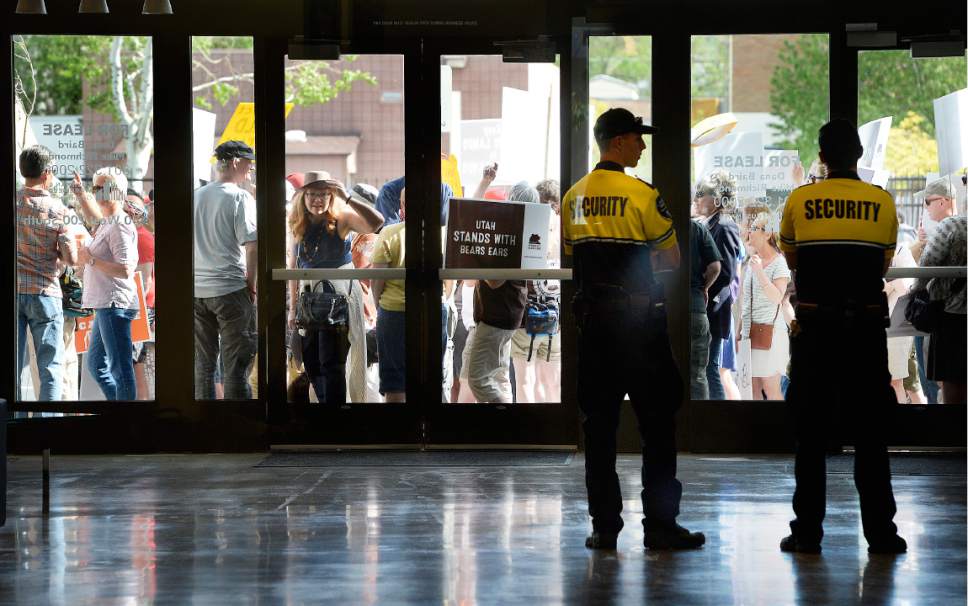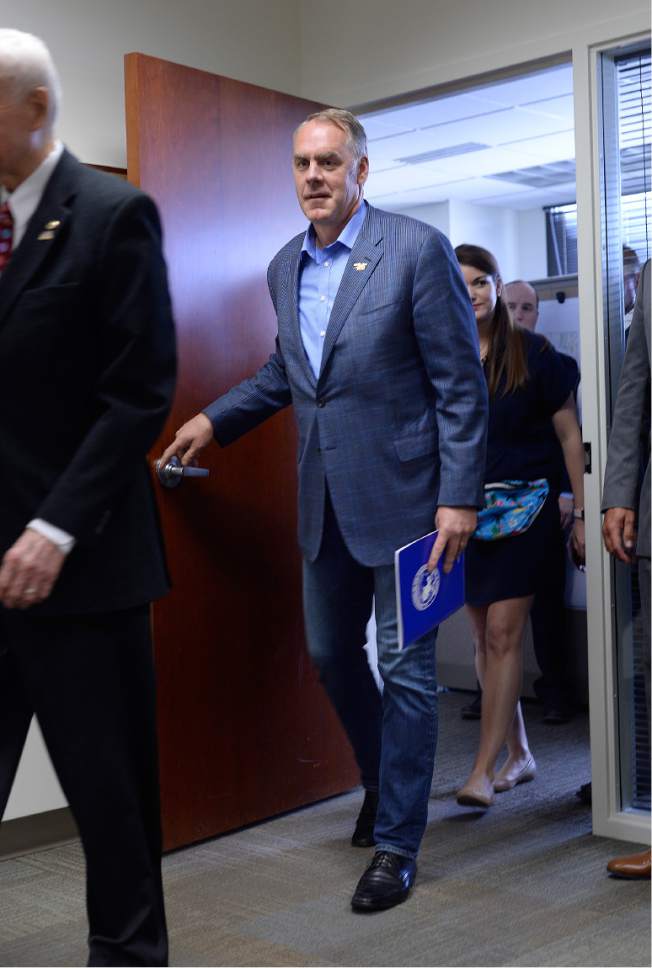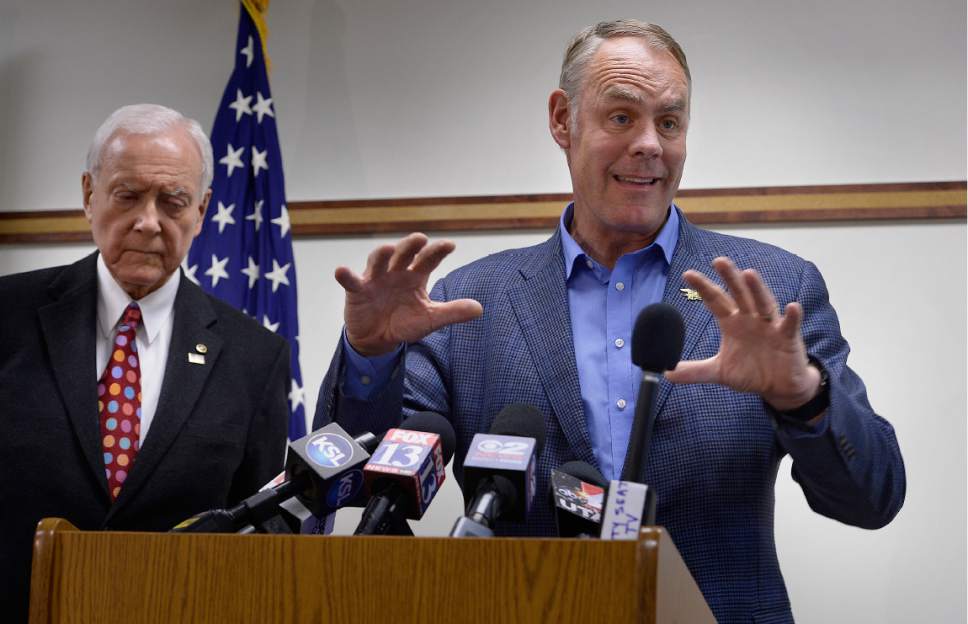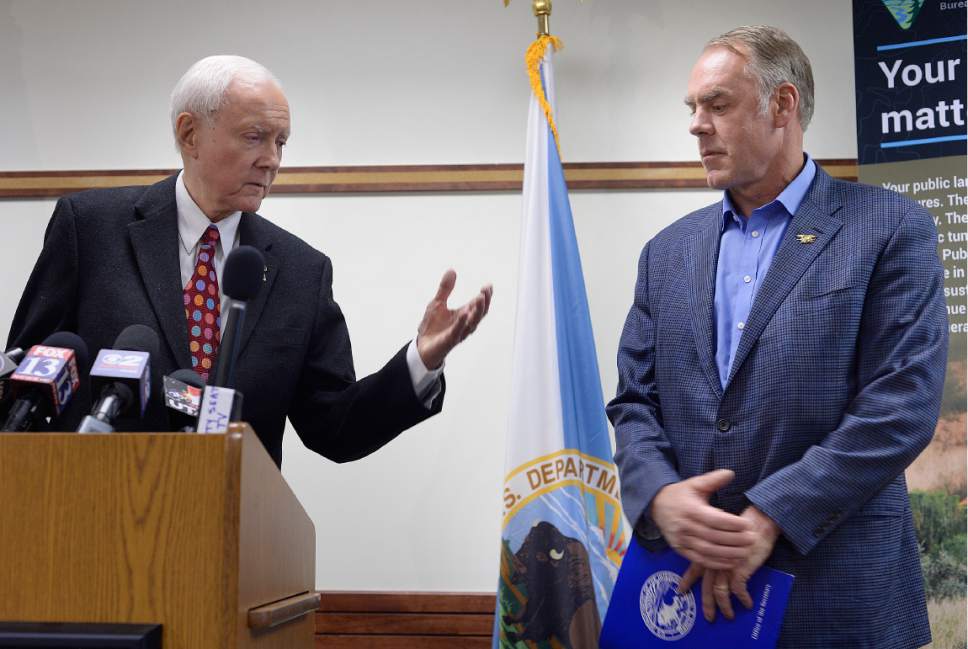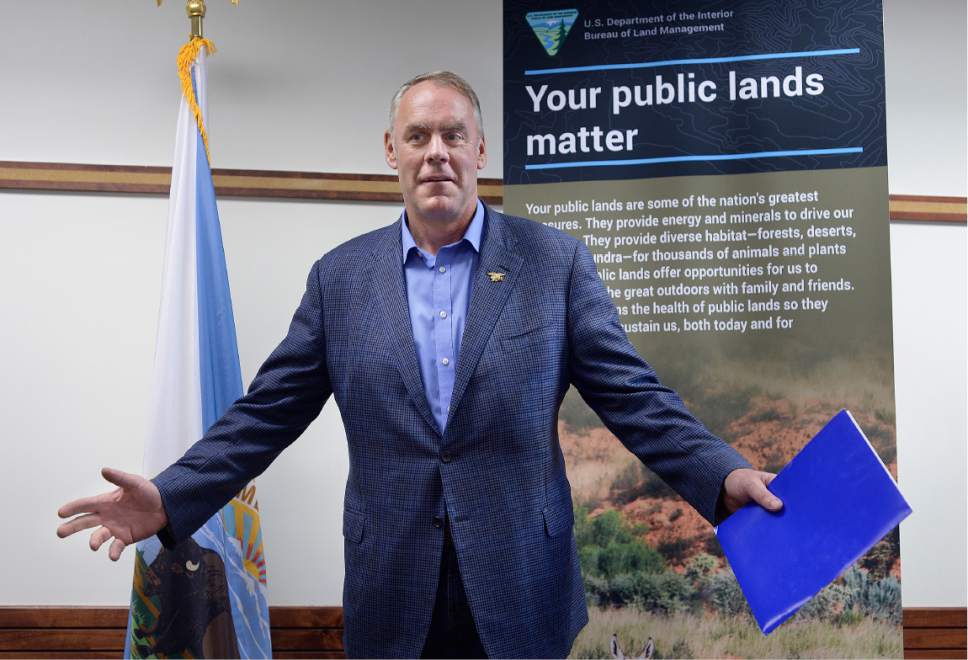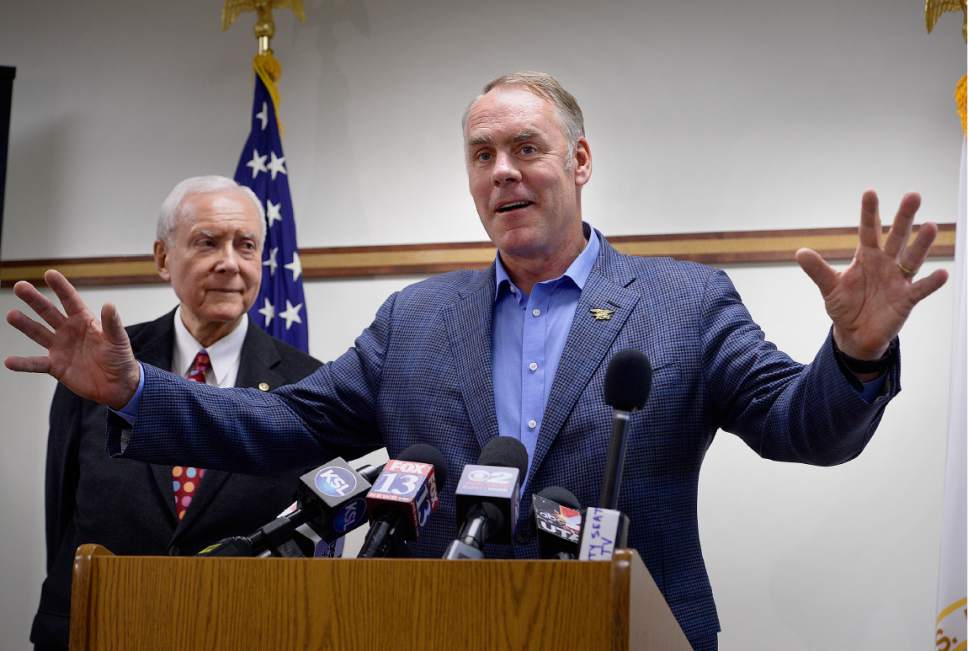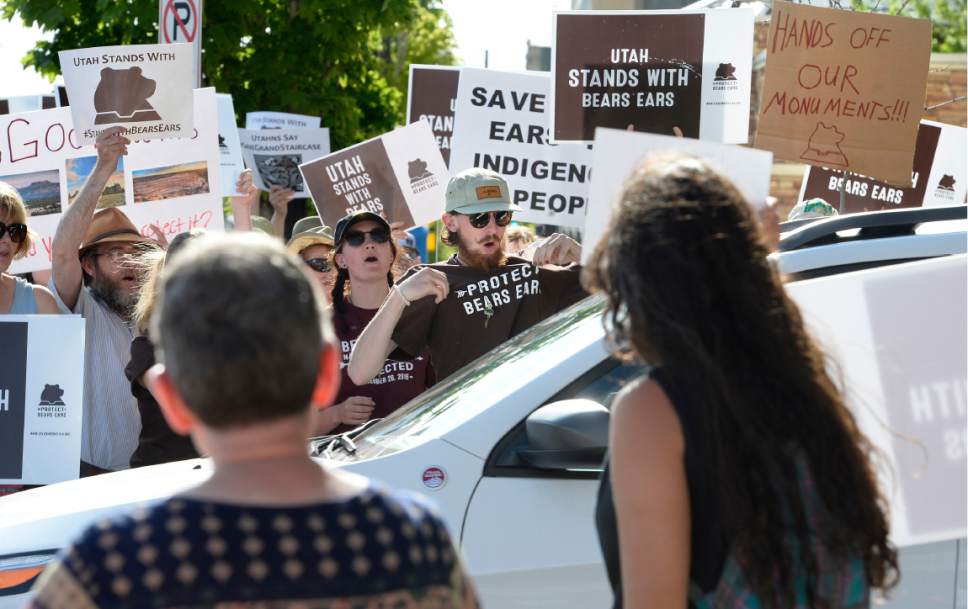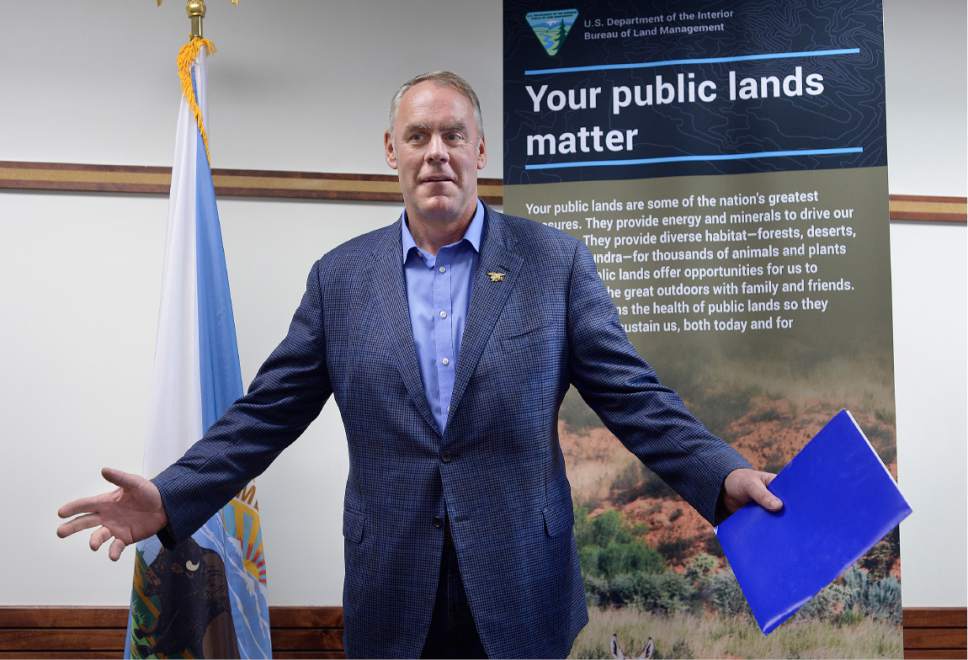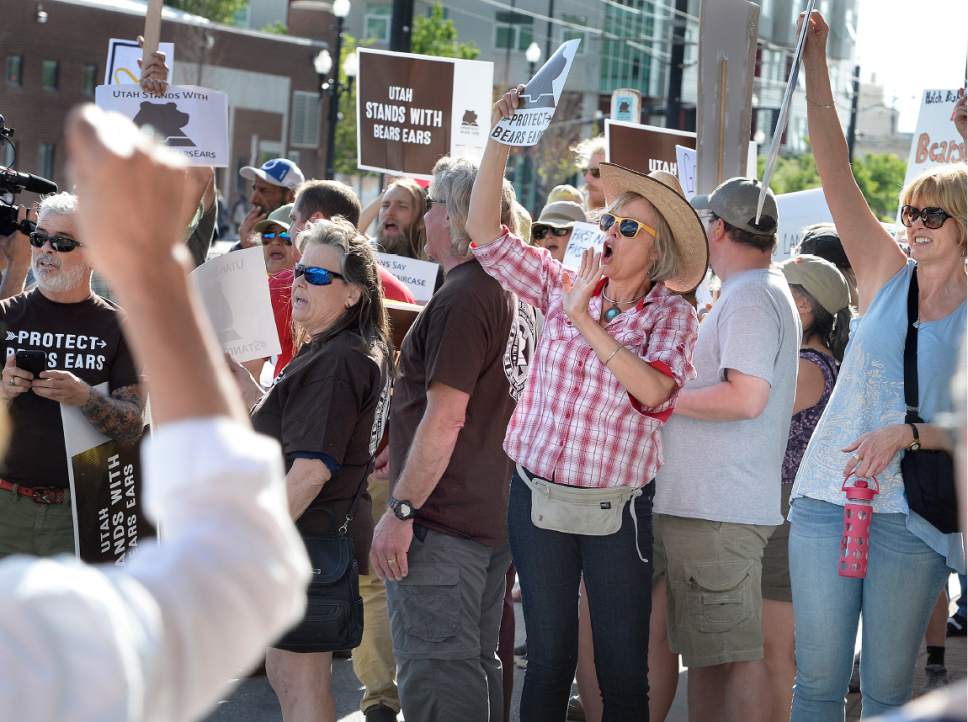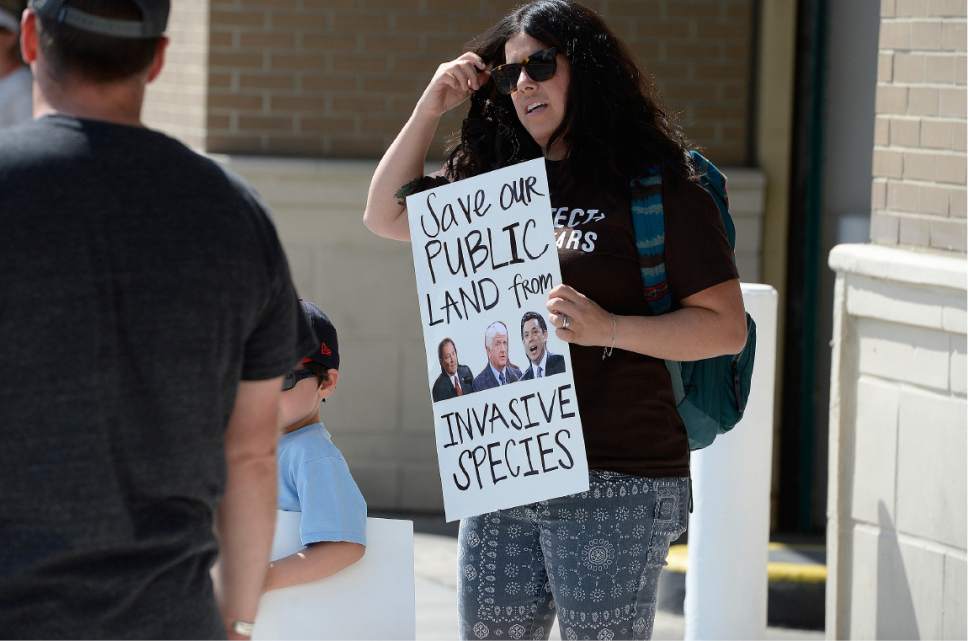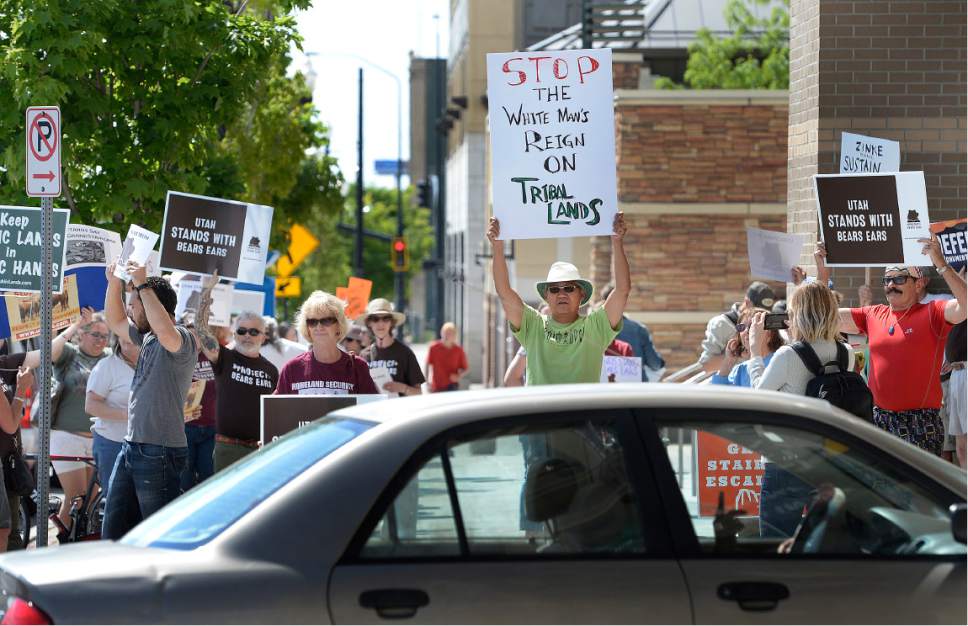This is an archived article that was published on sltrib.com in 2017, and information in the article may be outdated. It is provided only for personal research purposes and may not be reprinted.
As he embarked on a tour of Utah to review two national monuments, Ryan Zinke said he sees no evidence Native American proponents of Bears Ears National Monument were exploited by special interest groups, as state leaders have suggested.
"I think they're smart, capable, passionate, and have a deep sense of tie to their culture and want to preserve it," the secretary of the Interior said after a meeting with the Bears Ears Inter-Tribal Coalition, which requested the monument on behalf of five tribes, at Salt Lake City's Bureau of Land Management office on Sunday.
Minutes later, however, Sen. Orrin Hatch said Native Americans are "manipulated sometimes by people" and that the "far left" has further designs on the 1.35 million acres in southeastern Utah protected by President Barack Obama on Dec. 28.
"The Indians, they don't fully understand that a lot of the things that they currently take for granted on those lands, they won't be able to do if it's made clearly into a monument or a wilderness," Hatch said.
Asked to describe which activities Obama's designation would prevent Native Americans from doing, Hatch said, "That'd take too much time right now."
Pressed further for one example, Hatch said: "Once you put a monument there, you do restrict a lot of things that could be done, and that includes use of the land. ... Just take my word for it."
Navajo nation delegate Davis Filfred, who serves as member of both the tribal coalition and a tribal commission created to provide input on management of the monument, said Sunday night that the meeting with Zinke was overdue.
"I told him today that you met with the Utah delegation more than a couple of times thus far and this is the first time that we are meeting," Filfred said. "I'm requesting equal time."
While Filfred and others fight to defend it, Hatch and other state leaders have four days to convince Zinke that the Bears Ears National Monument designation constituted federal overreach and defied the will of most of the region's inhabitants.
Zinke then has until June 10 to recommend to President Donald Trump a fate for the newborn monument.
He also will stop within the boundaries of Grand Staircase-Escalante — whose 1996 designation by President Bill Clinton is the starting point for a review of 27 large monuments that was ordered by Trump. Utah leaders hope Trump will drastically reduce the boundaries of the 1.9 million-acre monument.
Zinke said he arrives in Utah "without any predisposition of outcome."
"Over the course of our history, I think it's undisputed that the monuments have been an effective tool to save [and] preserve some of our greatest cultural treasures," Zinke said, though he later added that "very few monuments are to the scale of the recent actions.
"Some of the monuments are, I don't want to say universally but certainly widely, supported and accepted," Zinke said. "The Bears Ears is not widely supported or accepted in the state of Utah."
His tour is reminiscent of one conducted last July by his predecessor, Sally Jewell, to inform Obama's decision.
Jewell witnessed striking vistas and delicate archaeological treasures as she weighed varied opinions about who should oversee them, and she concluded her visit by soliciting public comment for three hours inside a cramped Bluff Community Center.
The eventual designation hewed closely to boundaries in the Public Lands Initiative proposed by Utah's delegation, but if Obama's monument was intended as a compromise, it wasn't viewed that way by Utah leaders.
Hatch said Sunday that Obama made the declaration "without talking to any members of the delegation."
"It was pretty pathetic," he said.
Zinke's entourage drove past protesters lining the 200 South border of The Gateway shopping mall as he accessed BLM offices Sunday for his first meeting with a full complement of the Bears Ears Inter-Tribal Coalition. Zinke met earlier with Sens. Hatch and Mike Lee, Gov. Gary Herbert, Utah Attorney General Sean Reyes and state legislative leaders.
Proponents of the two disputed national monument designations worry that their voices will be absent from the Interior secretary's upcoming agenda.
Zinke's office rejected repeated requests to meet with members of the roundly pro-monument Boulder-Escalante Chamber of Commerce, writing "his current schedule is quite full and it's unlikely that he'll be able to accommodate any additional engagements." Chamber members were invited to comment on a forthcoming feedback website.
Members of Utah Dine Bikeyah, a grassroots nonprofit that supports the monument, also have called publicly for a meeting and sent Zinke's office a letter Sunday describing two previous letters and "several email and verbal requests" to meet.
Executive Director Gavin Noyes said Sunday that the Bears Ears boundaries were drawn based on the group's conversations with 75 Native American elders.
"We want to make sure that he doesn't trim any boundaries without talking to people who know the Bears Ears area the best," Noyes said. "The biggest risk at this point is that he believes that [largely anti-monument] Blanding and Monticello residents are the only people that he needs to meet with."
The Center for Western Priorities' Greg Zimmerman declared in a Sunday statement that Zinke's itinerary "[makes] it clear he intends for his visit to Utah to be a one-sided affair, ignoring input from local stakeholders who support national monuments at Bears Ears and Grand Staircase-Escalante."
Tribal leaders who pushed for the monument have said they will sue to preserve the protections, if necessary.
Filfred said Zinke agreed to meet with members of the intertribal coalition only last Wednesday, after multiple requests went unanswered.
Sunday's hourlong meeting was insufficient for them to state their case for the monument, he said. He was unimpressed by Zinke's posture and took a cellphone photo of the secretary reclining in his chair.
"You're asking this question as if we're supposed to answer it in one sentence, one phrase, one paragraph," Filfred said.
Zinke said Sunday that it's clear involved Native Americans "have roots in that area. They recognize that this is the first time that they're at the table, and there is some distrust of previous efforts that the tribe and tribes, in this case, aren't heard. Remarkably, that's the same argument I hear from many counties and many elected officials: that the federal government by and large has not heard the local voice."
As a freshman representative from Montana, Zinke opposed a GOP effort to transfer federal lands to states.
"The federal government needs to do a much better job of managing our resources, but the sale or transfer of our land is an extreme proposal, and I won't tolerate it," he said last June after voting against a bill that would have given states the option to buy 2 million federal acres for logging.
He also took sides against Rob Bishop when the Utah representative, who serves as Natural Resources Committee chairman, tried to block funding to the Land and Water Conservation Fund that the government uses to buy and conserve potentially threatened lands.
In January, however, Zinke said there was "no doubt the president has the power to amend a monument" and "[i]t will be interesting to see if a president can nullify a monument."
Utah's Legislature resolved during this year's session to ask Trump to rescind Bears Ears despite legal scholars' doubts that he has such authority.
Rep. Mike Noel, R-Kanab, who has been supported by Utah leaders as a candidate to lead the Bureau of Land Management, has said that "a whole lot of just plain old sagebrush" that could be ranched or mined lies within the boundaries of the two monuments.
A recent poll conducted by Dan Jones & Associates and commissioned by UtahPolicy.com found that a small majority of Utahns support reducing the acreage in Bears Ears or eliminating it altogether, while a similarly slim majority say Trump should leave the Grand Staircase as is.
Twitter: @matthew_piper


